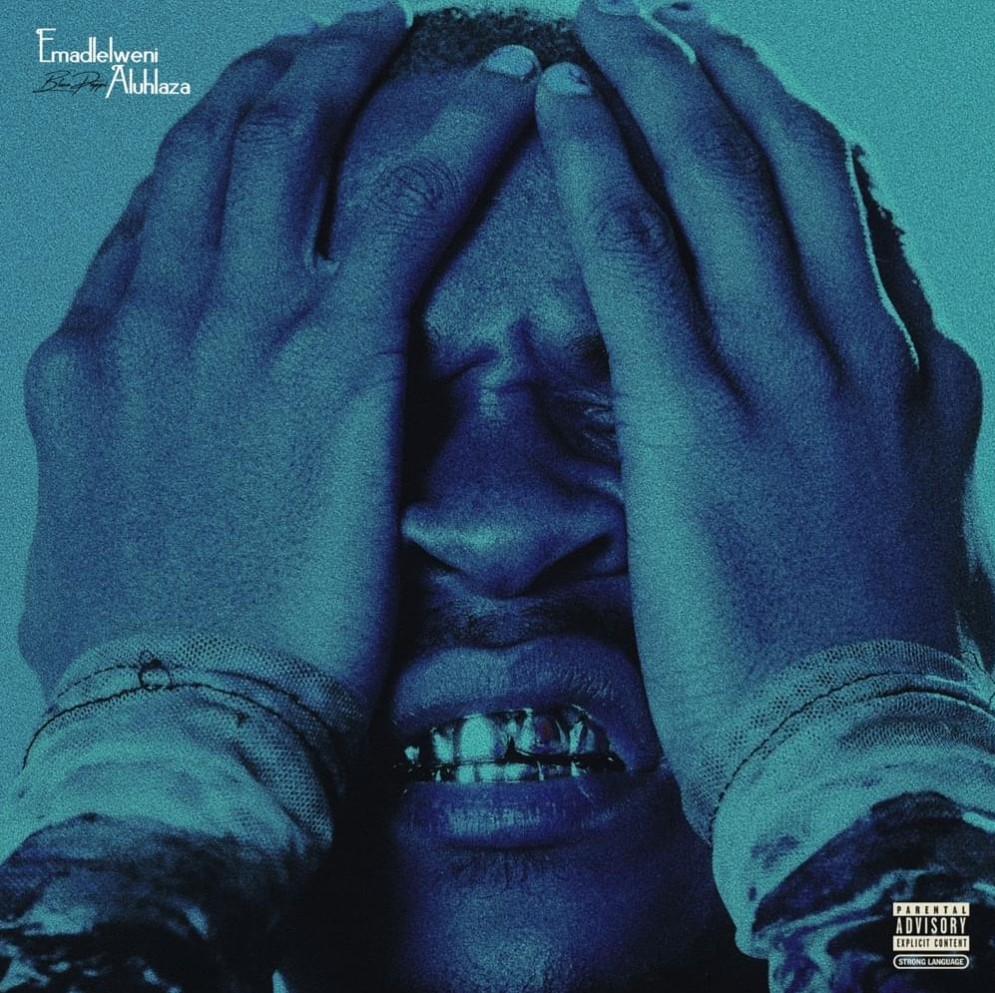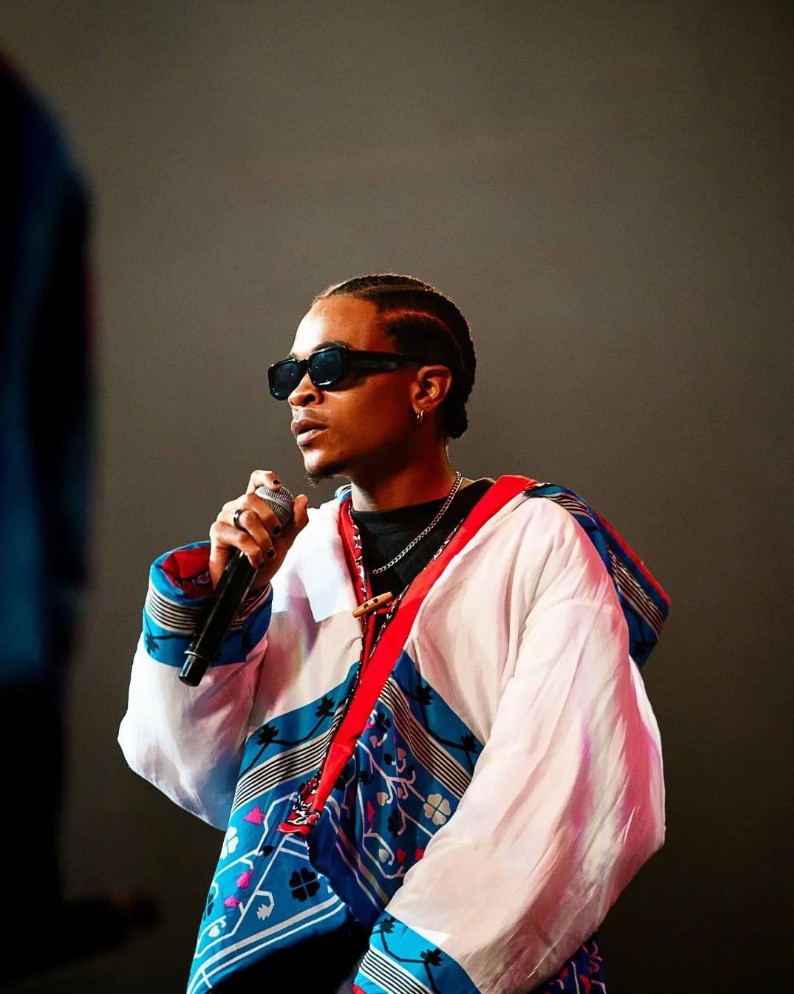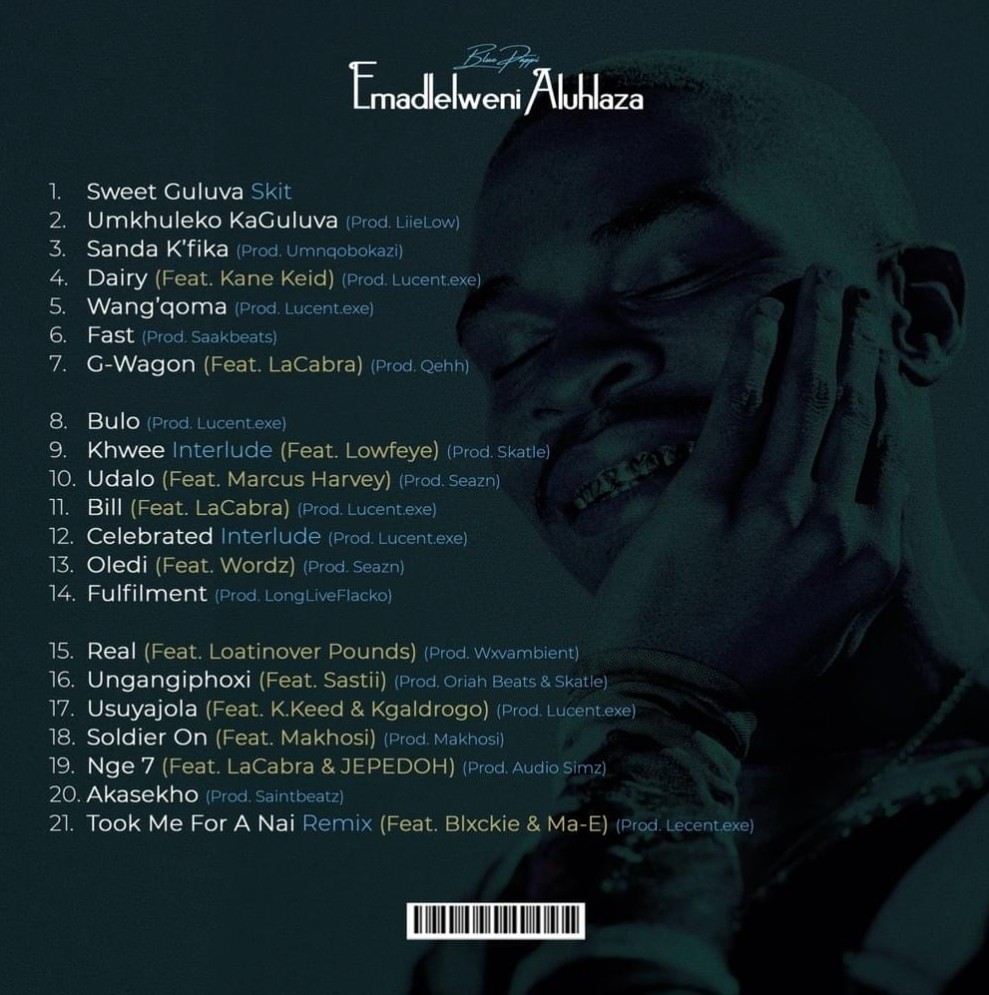Emadlelweni Aluhlaza is an engaging listen despite its considerable length. Its softness and vulnerability serve as an open invitation, keeping listeners immersed in its world from the cinematic introduction to the emotive final notes.
By Yinoluwa Olowofoyeku
Blue Pappi is a rising South African rapper and songwriter from Ladysmith in KwaZulu-Natal, now a key figure in the country’s buzzing alt-rap ecosystem and a leading face of the Qwellers creative collective. He began releasing music in his late teens, quickly carving out a distinct lane that blends diaristic storytelling, Zulu and English phrasing, and left-of-centre production choices.
In 2023, he delivered his first full-length statement with A Voice Like a Sequined Razor Blade, before expanding his palette in 2024 with OHLAZA, and sustaining momentum through a steady run of singles that honed both his melodic instincts and his writing voice. The pace has only quickened in 2025, with attention-grabbing releases such as “Dairy” and “G-Wagon”, alongside growing press and playlist support that have pushed him beyond a purely underground presence.
His new album, Emadlelweni Aluhlaza, arrives amid this sustained upswing and takes its title from Psalm 23’s “emadlelweni aluhlaza”, which translates as “green pastures” — a phrase long associated with guidance, protection, and renewal. It is a telling choice, suggesting both spiritual grounding and forward momentum, and it positions the record as the next chapter in a young catalogue already marked by unusual range and intent.
Emadlelweni Aluhlaza opens on a cinematic note with “Sweet Guluva Skit”, where guitars and a solemn saxophone set the stage as conversational voices address the listener over group harmonies, easing seamlessly into “Umkhuleko Kaguluva”. Here, the mood remains hushed and reflective, with jazzy piano chords and deep 808 bass anchored by boom-bap percussion.
Blue Pappi blends English and Zulu in a half-sung cadence, his vocals solemn yet melodic, before transitioning into the more groove-oriented “Sanda K’Fika”. Gentle piano lines intertwine with log drums and rattling hi-hats, while his delivery shifts from smooth raps into a softly sung hook that declares, “Superstar, they see me they say wow”. Together, these opening pieces form a triad of meditative, prayer-like moments that introduce the listener to the vulnerable, reflective side of the record.

That reflective current continues on songs like “Wang’qoma” and “Fast”, which present contrasting emotional palettes while still orbiting themes of memory and struggle. “Wang’qoma” pares back the production to sparse synth chords and chopped vocal samples, the weight of its 808s and clicking snares carried almost entirely by Blue Pappi’s falsetto notes and emotive Zulu singing — his focus less on clever lyricism than raw feeling.
“Fast” counterbalances this with jazzy piano chords and a looped saxophone, over which he reflects on his rapid ascent and the opportunism of the industry. His semi-sung, melodic rap cadence strikes a balance between boast and lament as he asks, “Where were you when the label tried to sign us for crumbs … when the industry tried to take us for bums”.
Other moments lean into experimentation. “Dairy”, featuring Kane Keid, is built on strings, arpeggiated synth loops, and booming drums. Blue Pappi adapts with versatility, rapping in monotone bursts before breaking into higher-pitched passages, pivoting between braggadocio and urgency as the beat morphs beneath him.
That willingness to play with texture is pushed further on “G-Wagon”, where an off-kilter two-chord progression, chopped into an unusual rhythmic sample, forces him to rap against the grain. He responds with staccato bars before dissolving into softer melodic refrains — a push-and-pull that mirrors the tension between the desire for material success and the recognition of its hollowness.
Emadlelweni Aluhlaza’s middle stretch turns toward tenderness and R&B atmospheres. “Bulo” is perhaps the most ethereal of these, carried by jazzy piano chords and a sparse but steady drum pattern that leaves space for Blue Pappi to croon lines such as, “You are an angel on my shoulder”. He layers his gravelly voice with backing harmonies and warm ad-libs, expanding into his full vocal range.
“Khwee Interlude”, with Lowfeye, continues this jazz-tinged palette, though its breathy, off-kilter vocal unsettles as much as it soothes. Later, “Udalo” and “Bill” ride buoyant piano and synth grooves — the former offering a back-and-forth of rapped bursts and semi-sung cadences alongside Marcus Harvey, while the latter stretches into laid-back swagger with LaCabra, its bass and keys providing the perfect backdrop for understated melodic flows.
“Celebrated Interlude” then turns inward, its aquatic synth washes cushioning a mantra-like verse where he insists, “In my city dawg I’m celebrated / So if you show me fake love, I’ll detect it.” His delivery is calm and assured, midway between rap and a whispered R&B croon.
“Oledi” and “Fulfilment” are cut from a darker cloth, propelled by syncopated drums and bass-heavy samples. On “Oledi”, he launches directly into rapid-fire rap bars, the chorus circling around an invocation of his mother’s concern as he asserts his drive. “Fulfilment” expands the palette with reversed key samples and groovy drums, as Blue Pappi confesses, “My heart so cold, I’m immune to the feelings / I got bitches on bitches, and racks on racks / And still all these riches don’t bring me fulfilment”. The track swells with triplet flows, tempo shifts, and passages of soft singing backed by rich harmonies — a sonic embodiment of inner contradiction.

Emadlelweni Aluhlaza’s most tender and spiritually resonant passages arrive in its later chapters. “Real”, featuring Loatinover Pounds, layers falsetto singing and soulful piano chords over dreamy synth pads, with the hook affirming, “Life so real, I can’t even cope with the fake / Keep it real, I can’t sell my soul for the fame”. The guest verse grounds the track with steady, heartfelt storytelling.
“Ungangiphoxi” extends the sincerity with Sastii’s expressive Zulu vocals, electric piano chords, and ambient heartbeat drums, forming a smooth, heartfelt ballad. “Usuyajola” draws on warm R&B harmonies from K.Keed and Kgaldrogo, with choir-like synths and rich vocal interplay, building one of Emadlelweni Aluhlaza’s most convincing love songs.
“Soldier On” feels like the spiritual climax, children’s voices in the background lending poignancy as Makhosi’s bright singing is lifted by female group harmonies and log drums, an uplifting hymn to perseverance.
The closing act threads together introspection and experimentation once more. “NGE7” blends ethereal piano pads and dreamy textures with straightforward rap cadences, the featured acts adding variety while retaining its moody drive. “Akasekho” pares the palette back to guitars and keys, a ballad sung in Zulu and English where Blue Pappi mourns youthful recklessness and pleads, “The kid inside of me, he dead / Half the time I ain’t thinking straight, I’m faded”.
Finally, the remix of “Took Me For A Nai”, with Blxckie and Ma-E, closes the record on a mix of bounce and reflection. Muted pianos, bass guitar, and light sax riffs underpin rapid staccato flows, braggadocious verses, and tight cadences, the album fading out on expressive piano chords and thumping bass — a final blend of grit and musicality.
Emadlelweni Aluhlaza is a gentle journey through the life, times, and mind of a budding artiste intent on opening himself up to his audience. Blue Pappi positions himself as equal parts rapper and singer, but his truest watchword is expression, with storytelling as its chosen vessel.
His writing is grounded in autobiography, moving between reflections on hardship, meditations on growth, and quiet celebrations of survival. Delivered largely in Zulu but peppered with English that gives non-speakers a foothold, his words reveal a deliberate thoughtfulness. Even when the lyrics alone do not suffice, the surrounding creative choices lean into the same commitment to narrative and mood, ensuring expression always remains front and centre.
The production that frames these stories is subtle, atmospheric, and moody. For much of Emadlelweni Aluhlaza, it resists urgency, favouring a gentle, soulful drift of jazzy chords, sparse instrumentation, and airy textures. When bursts of energy appear, they do so sparingly — heightening the emotional arc and providing necessary dynamic contrast. A foundation of boom-bap drums anchors the record, but they are regularly stretched, bent, and reshaped with off-kilter programming that avoids monotony and instead creates a platform where the vocals remain the clear focal point.

And those vocals rise to the task. Blue Pappi alternates between singing and rapping with a consistent focus on feel over perfection. His sung passages rely less on agility or technical virtuosity and more on tone, range, and the capacity to convey emotion. Falsettos, breathy highs, and moments of strain become features rather than flaws, adding rawness to the mood.
The presence of layered harmonies, ethereal backing vocals, and carefully chosen samples enriches the atmosphere further, enveloping the listener in an expressive sound world. When it comes to rapping, he delivers with confidence and precision: punchy lines meet versatile flows, cadences bend towards melody when needed, and his command of rhythm allows each verse to stand firm.
Taken as a whole, Emadlelweni Aluhlaza is an engaging listen despite its considerable length. Its softness and vulnerability serve as an open invitation, keeping listeners immersed in its world from the cinematic introduction to the emotive final notes. Blue Pappi emerges as a versatile artiste whose storytelling is both intimate and expansive, and whose willingness to bare himself through voice and sound leaves a lasting impression.
If this is the blueprint for how he continues to express himself, then Emadlelweni Aluhlaza may well be the opening chapter in a much longer journey of artistic discovery.
Lyricism – 1.5
Tracklisting – 1.4
Sound Engineering – 1.7
Vocalisation – 1.5
Listening Experience – 1.5
Rating – 7.6/10
Yinoluwa “Yinoluu” Olowofoyeku is a multi-disciplinary artist and creative who finds expression in various media. His music can be found across all platforms and he welcomes interaction on his social media @Yinoluu.




